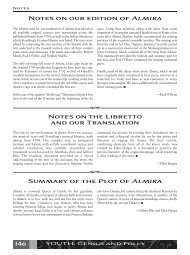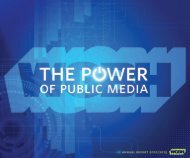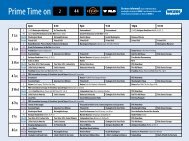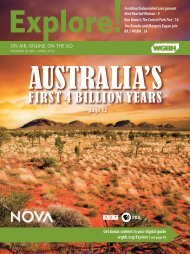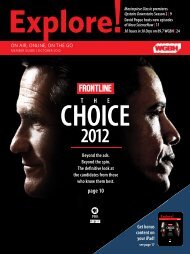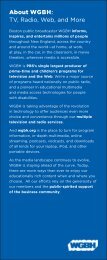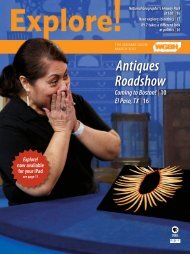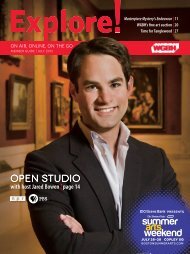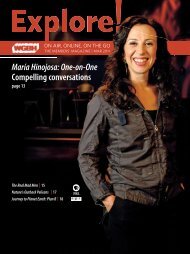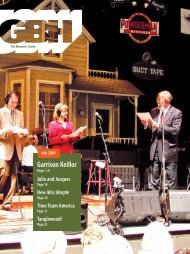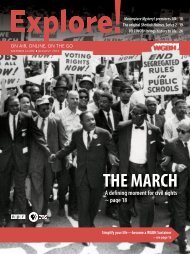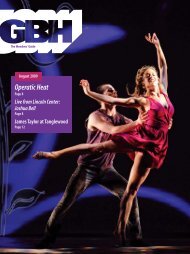Clinton - WGBH
Clinton - WGBH
Clinton - WGBH
Create successful ePaper yourself
Turn your PDF publications into a flip-book with our unique Google optimized e-Paper software.
Advertisement<br />
89.7 <strong>WGBH</strong>, Boston Public Radio<br />
<strong>WGBH</strong> Archives Bring Depth to Today’s Life Science Stories<br />
5am<br />
6am<br />
7am<br />
7:50am<br />
9am<br />
10am<br />
12pm<br />
1pm<br />
2pm<br />
3pm<br />
4pm<br />
6pm<br />
7pm<br />
8pm<br />
12am<br />
By Phil Redo<br />
Managing Director, 89.7 <strong>WGBH</strong>, Boston Public Radio<br />
Almost five years ago, during a speech at the BIO 2007<br />
conference, Governor Deval Patrick announced the<br />
Massachusetts Life Sciences Initiative: a $1 billion<br />
investment package (over 10 years) to enhance and<br />
strengthen the state’s already internationally recognized<br />
leadership in the field.<br />
Life sciences is one of <strong>WGBH</strong> Radio’s editorial areas of concentration, and<br />
last fall listeners to <strong>WGBH</strong>’s Morning Edition heard an intriguing story reported<br />
by host Bob Seay.<br />
A young metabolic engineer, Jake Wintermute, and his colleagues at<br />
Harvard Medical School think they may have unlocked some important<br />
secrets about LSD, the notorious and illegal drug promoted in the 1960s by<br />
doctor/guru Timothy Leary.<br />
For more than 40 years, LSD and its close chemical relative, lysergic acid,<br />
have basically been under lock and key as controlled substances, and strictly<br />
regulated by both federal and state laws.<br />
Wintermute, who recently earned a PhD from Harvard Medical School<br />
in the Department of Systems Biology, has been researching pathways to<br />
new drugs these long-blacklisted compounds might yield. His interest is in<br />
lysergic acid, which can be made both cheaply and quickly using new bioengineering<br />
methods.<br />
The actual mechanism by which the compound works is still somewhat<br />
mysterious, Wintermute admitted, but said it has something to do with it<br />
What’s on 89.7 <strong>WGBH</strong><br />
Monday–Friday<br />
BBC World Update<br />
The Takeaway<br />
Morning Edition/Marketplace Morning<br />
The Xconomy Report (Fri)<br />
The Takeaway<br />
The Diane Rehm Show<br />
The Emily Rooney Show<br />
The Callie Crossley Show<br />
Fresh Air<br />
The World<br />
All Things Considered<br />
The World<br />
PBS NewsHour<br />
Jazz on <strong>WGBH</strong> with Eric Jackson/<br />
Jazz on <strong>WGBH</strong> with Steve Schwartz (Fri)<br />
Jazz with Bob Parlocha<br />
Saturday<br />
acting as a vasodilator: “It sort of opens up the blood vessels of the brain,<br />
improves the circulation in the brain; the sort of enhanced clarity that people<br />
on these drugs can sometimes benefit from comes from that.”<br />
While the technology is obviously critical, so is curiosity and, in this<br />
case, a dose of courage. “There are a lot of exciting new drugs that are being<br />
developed thanks to these new bioengineering technologies,” Wintermute<br />
told <strong>WGBH</strong>. “And no one yet has taken up lysergic acid as a kind of promising<br />
new precursor, and I think a lot of that is because there is this kind of stigma,<br />
taboo, when you are working on something that is so illegal or so close to<br />
illegal.”<br />
The potential benefits of such a new drug? Easing symptoms of Parkinson’s<br />
disease, a therapy for migraines and treatment for elder dementia.<br />
Drawing from<br />
materials in <strong>WGBH</strong>’s<br />
archives, Seay’s radio<br />
piece featured the<br />
opinions of the late<br />
Dr. Leary, who could be<br />
heard debating the<br />
benefits of LSD with<br />
Jerome Lettvin, an MIT<br />
professor, psychiatrist<br />
and cognitive scientist. Their exchange was lifted from a program that aired<br />
on <strong>WGBH</strong> television back in 1967. Far out!<br />
Watch the hour-long Lettvin-Leary debate online at<br />
openvault.wgbh.org/blog/2011/09/lsd-lettvin-vs-leary/<br />
Note: Schedule information accurate at press time; find the latest programming updates online at wgbh.org/radio<br />
Listen online at wgbh.org/listen, on your Internet radio, or on your HD radio at 89.7 HD1<br />
6am Living on Earth<br />
7am Innovation Hub<br />
8am Weekend Edition<br />
10am Studio 360<br />
11am This American Life<br />
12pm Says You!<br />
1pm Wait Wait…Don't Tell Me!<br />
2pm The Moth/Radio Lab<br />
3pm A Celtic Sojourn<br />
6pm A Prairie Home Companion<br />
8pm Says You!<br />
9pm Selected Shorts<br />
10pm JazzSet with Dee Dee Bridgewater<br />
11pm Jazz with Bob Parlocha<br />
6am<br />
7am<br />
8am<br />
10am<br />
11am<br />
12pm<br />
2pm<br />
3pm<br />
4pm<br />
5pm<br />
6pm<br />
7pm<br />
8pm<br />
10pm<br />
11pm<br />
12am<br />
Sunday<br />
On the Media<br />
Being<br />
Weekend Edition<br />
Bob Edwards Weekend<br />
Wait Wait…Don't Tell Me!<br />
A Prairie Home Companion<br />
Says You!<br />
America's Test Kitchen Radio<br />
Marketplace Money<br />
All Things Considered<br />
Humankind<br />
Jazz Decades<br />
Arts & Ideas<br />
Innovation Hub<br />
Eric’s Artist Spotlight<br />
Jazz with Bob Parlocha<br />
News programs on 89.7 <strong>WGBH</strong> are made possible by your contributions to the Independent Journalism Fund.<br />
24 Schedules, program info, playlists: wgbh.org/897<br />
The World Geo Quiz answer (see page 25): Ulcinj, Montenegro



